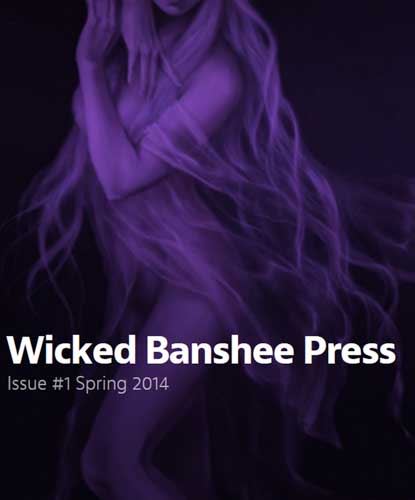Wicked Banshee Press – Spring 2014
After a brief interview with Denise Frohman and a note from Women of the World Poetry Slam Host City Chair, Wicked Banshee Press (a brand new online journal) plunges right into the poetry, and it doesn’t fool around with any feet-wetting. The very first poem sends a strong emotional sting with Tara Betts’s “Throwing Away a Wedding Dress.” Describing it as “dented and dew-dotted, dried / fondant, crumbling and collapsed / in loose folds,” a metaphor for the entire marriage.
After a brief interview with Denise Frohman and a note from Women of the World Poetry Slam Host City Chair, Wicked Banshee Press (a brand new online journal) plunges right into the poetry, and it doesn’t fool around with any feet-wetting. The very first poem sends a strong emotional sting with Tara Betts’s “Throwing Away a Wedding Dress.” Describing it as “dented and dew-dotted, dried / fondant, crumbling and collapsed / in loose folds,” a metaphor for the entire marriage.
And as this poem’s strength comes from the emotional tug and twist, each poem here seems to have its own unique pull tactic. The next poem we encounter is Reena Berroa’s “Foreigner,” one of the most powerful poems in the collection. It starts, “When falling in love with men with decorous eyes and loyal chests, / remember you are foreigner,” and follows the couple through a course of dinner where she is constantly reminded that she is different, but the power comes with the narrator’s powerful perseverance to not let it get her down:
When your boyfriend is not brave enough to whisper your name without
guilt carved across his cheeks,
when everyone is trying to make a wife out of you before you make a
woman of yourself.
When he sits at the dinner table only willing to claim you fad,
phase,
flame,
to be blown out,
be your own happy ending
Simple and straightforward, Cassandra de Alba’s “some anxiety metaphors” is easily relatable, tackling a feeling many of us have far too often: “twine from each pore of the showerhead / mud from the faucet / in the backyard a single hole growing larger.”
Lea Deschenes’s pull, for me at least, was the dark tone, and excellent word choice:
They consider your one face obscene,
mouth a plague, so why speak? When you try,
they slip out of the woodwork, surround you
in sleep. Stuff your throat with blank sheets,
origami giraffes, feathered swans. You choke
on their bleached-letter soup and fail
to cut purpose a vent through the weights
on your chest:
And different yet, Sacha Jacobson employs the tactic of word choice in a way that it takes all the clichés and typical meanings of words and kind of explodes it onto the page, making it bigger and better and more meaningful rather than dull and overused. In “TRAFFICK” she uses both “traffic” and “traffick” to get her point across. In “GET BIG FAST or HOW TO BECOME A BURNOUT” she uses imagery of fire and smoke, and with each stanza, the fire (the poem, the feeling) grows with intensity until it, as each one must do, fizzles out.
They will call you great,
Infamous, angry, relentless
They will remember you
They will always remember you
But not for your flame or talent for illumination
Not for the time you beat out the stars
And lit up the night with all you had in you
They will remember your callous, your evil
Your black mark, your scorch
They will remember the moment you finally
Went out
As with all the examples I’ve provided, all the contributors (and editors) are female (including those who identify as women or live their life as women). The editors are looking for writing that “is unapologetic in its honesty and integrity, poetry that aims to identify with the reader and leave them soul shocked,” and I have to say they accomplished their goal even in the very first issue. I look forward to seeing how far this publication can push.
[wickedbansheepress.wix.com]






